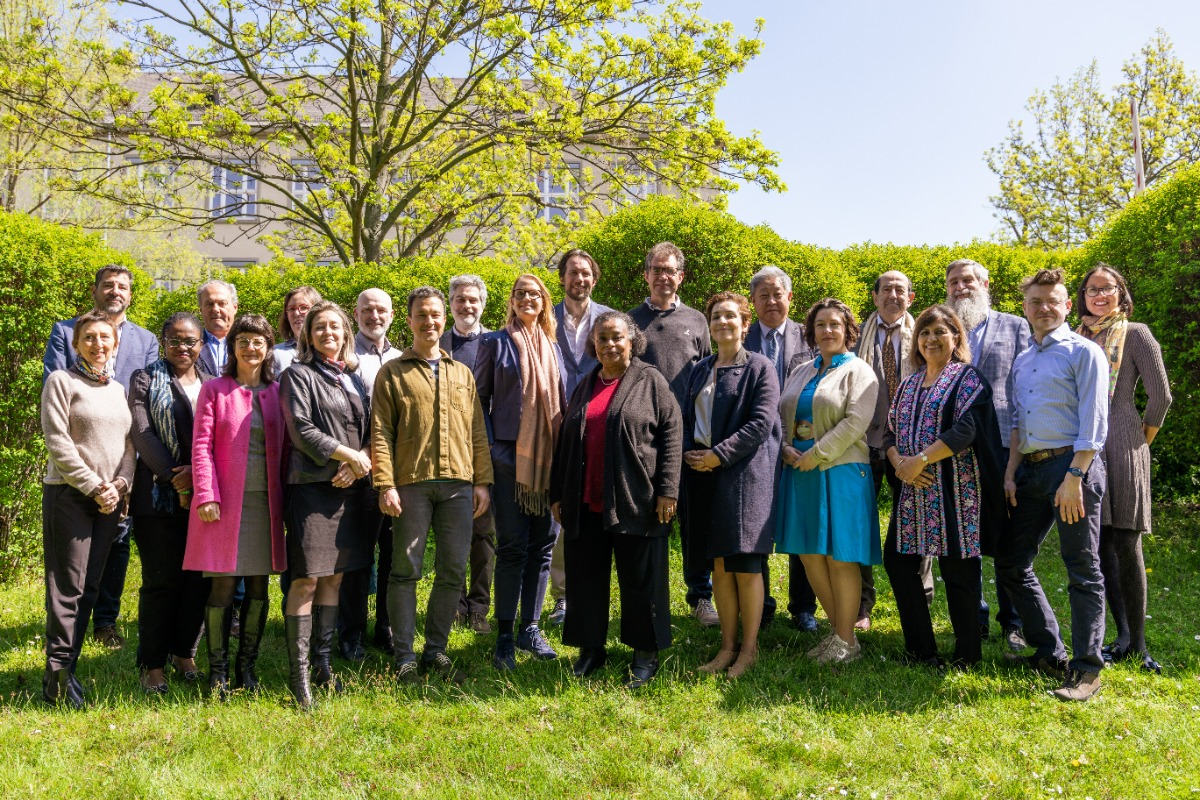

Successful 141st IPSA Executive Committee Meeting and Academic Workshop in Dresden
Publication date: Tue, 16 May 2023
Photo: The group photo of IPSA's Executive Committee in Dresden.
The Chair of Comparative Politics, Institute of Political Science at the Technical University of Dresden (TU Dresden) and the Hannah-Arendt Institute for Totalitarianism Studies (HAIT) organized an international workshop in collaboration with IPSA on Threats to Democracy and Resiliency of Democracy - Global Perspectives from 19-21 April 2023 in Dresden, Germany. The workshop was organized to coincide with IPSA’s 141st Executive Committee Meeting, which also took place at TU Dresden on 22-23 April.
The efforts and contributions of IPSA Past President Marianne Kneuer were instrumental in the successful organization and execution of the workshop. We would like to express our sincere gratitude to Prof. Dr. Kneuer and her dedicated team at TU Dresden.
The international workshop brought together several IPSA Executive Committee (EC) members, prominent scholars, politicians, and journalists to discuss the challenges facing democratic systems and to explore potential solutions.
DAY 1
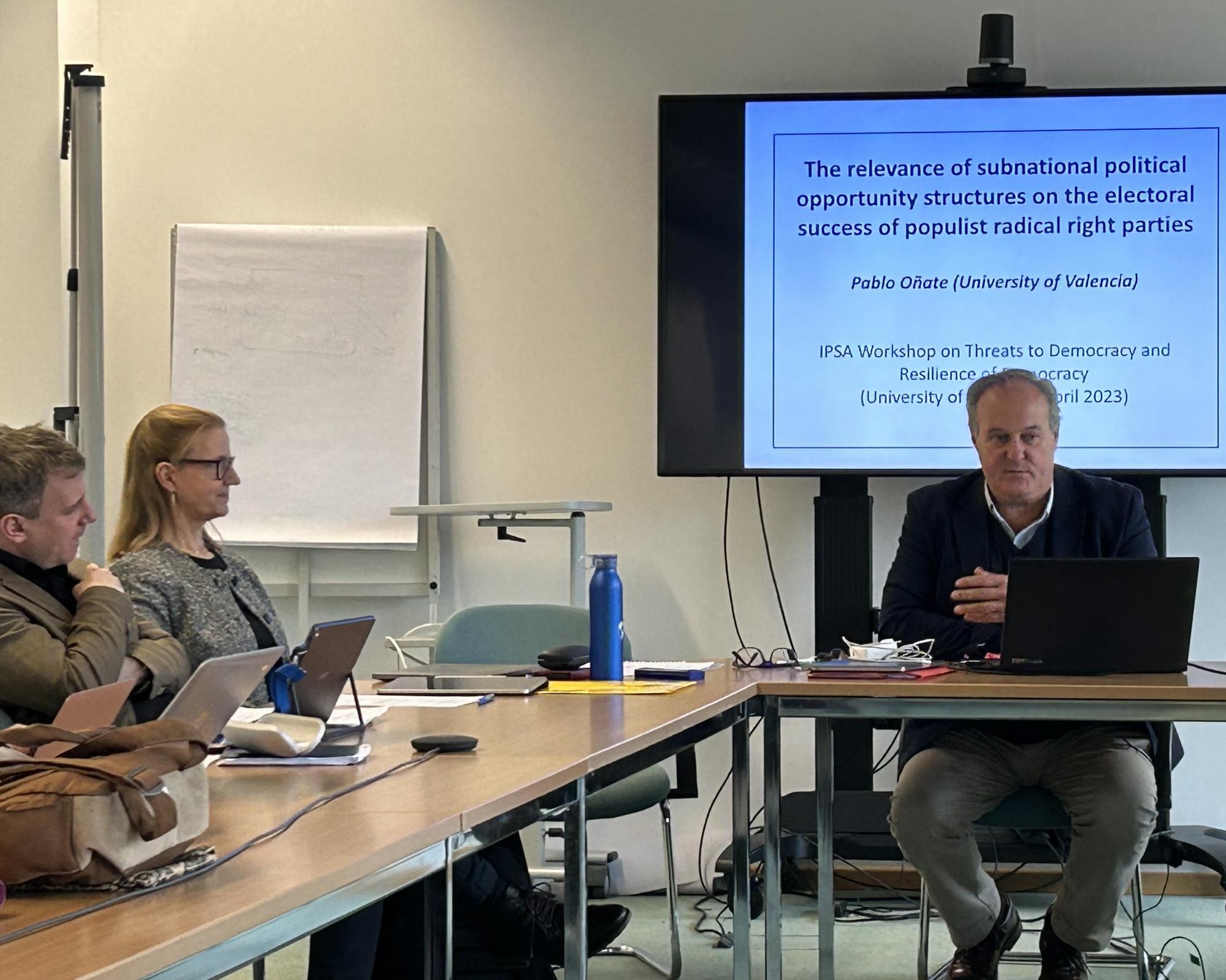 Panel: Populism as Threat to Democracy I & 2
Panel: Populism as Threat to Democracy I & 2
The first two panels of the international workshop focused on the current threats to democratic systems and the importance of developing resilience to counter these threats.
The first panel, chaired by Serge Granger (IPSA EC member, Université de Sherbrooke), explored the rise of populist radical right parties and their impact on democratic processes. Pablo Oñate’s (IPSA President-Elect, University of Valencia) research, Nationalism, Subnational Political Opportunity Structures, and the Rise of the Populist Radical Right, analyzed the relationship between the success of populist radical right parties and the political opportunity structure at a subnational district level. Daniel Stockemer’s (IPSR Co-editor) paper, The Republican Trump Voter: A Populist Radical Right Voter Like Any Other?, demonstrated how the Republican Party has transformed into a radical right-wing party and examined the degree to which the Trump voter has the same or similar characteristics as the prototypical radical right-wing voter. Finally, Luise Anter, Uwe Backes, Reinhard Heinisch, Steffen Kailitz and Carsten Wegscheider’s (HAIT) presentation, How Does the Next Generation of Populist Radical Right Leaders Understand Democracy? Evidence from a Vignette-Based Interview Project with Party Youth Leaders from Germany and Austria, examined the leaders of populist radical right parties in Europe to better understand how they view democracy.
Photo: IPSA President-Elect Pablo Oñate.
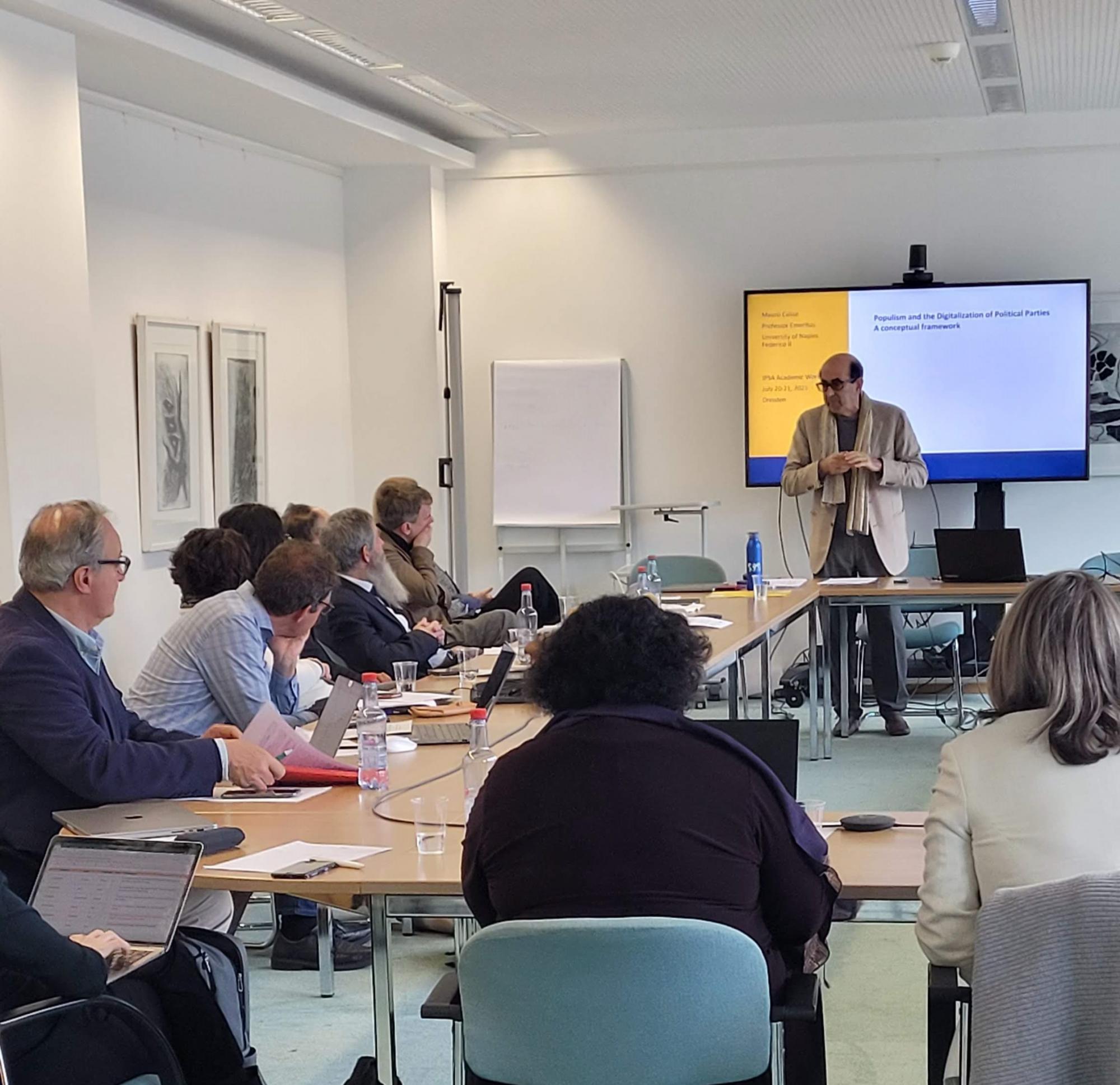 The second panel, chaired by Prof. Oñate, examined the phenomenon of populism and its impact on democratic governance. Jakub Wondreys’ (HAIT) presentation The Enemy of my Enemy is my Friend? The European Far Right’s and Far Left’s Love Affair with Putin’s Russia explored the growing attraction of the European far rights towards Russia and its leader Vladimir Putin. Manès Weisskirchner’s (TU Dresden) paper, The Radical Right and Climate Change, examined how populist movements are responding to the urgent global issue of climate change. The final presenter, Mauro Calise (University of Naples Federico II), analyzed how digital technologies are transforming the ways in which populist parties organize and mobilize their supporters.
The second panel, chaired by Prof. Oñate, examined the phenomenon of populism and its impact on democratic governance. Jakub Wondreys’ (HAIT) presentation The Enemy of my Enemy is my Friend? The European Far Right’s and Far Left’s Love Affair with Putin’s Russia explored the growing attraction of the European far rights towards Russia and its leader Vladimir Putin. Manès Weisskirchner’s (TU Dresden) paper, The Radical Right and Climate Change, examined how populist movements are responding to the urgent global issue of climate change. The final presenter, Mauro Calise (University of Naples Federico II), analyzed how digital technologies are transforming the ways in which populist parties organize and mobilize their supporters.
Photo: Mauro Calise, University of Naples Federico II.

Panel: Autocratization as Threat to Democracy
The Autocratization as Threat to Democracy panel, chaired by Arkadiusz Zukowski (IPSA EC member, University of Warmia and Mazury in Olsztyn) benefited from the insightful perspectives of discussant Mark Arenhövel (TU Dresden).
Azul Aguiar Aguilar (EC member, Jesuit University of Guadalajara) addressed the issue of judicial erosion of democracy in Latin America, shedding light on the challenges faced by democratic institutions in the region. Nadine Machikou (EC member, University of Yaoundé II) compared the role of parliaments and autocratization in Cameroon, Benin, Burundi, and Rwanda, offering a comparative perspective from Africa. Marianne Kneuer (IPSA Past President, TU Dresden) discussed the implications of democratic erosion at the national, regional, and international levels, providing a comprehensive understanding of its far-reaching consequences. Finally, Umut Korkut (IPSA Vice President, Glasgow Caledonian University) focused on the intriguing topic of autocracy's persistence despite economic crises, exploring the factors of trauma, paralysis, and continuity.
Photo: IPSA Past-President Marianne Kneuer.
 Opening Ceremony and Words of Welcome by IPSA Past President, Marianne Kneuer
Opening Ceremony and Words of Welcome by IPSA Past President, Marianne Kneuer
Following the first day of panels, a public event was held at the Institut für Holztechnologie Dresden, featuring words of welcome by IPSA Past President Marianne Kneuer, and the Executive Director of the German Political Science Association Vera van Hüllen.
In her opening remarks, Prof. Kneuer emphasized the importance of the collaboration between IPSA and TU Dresden and thanked IPSA and EC members for their contribution.
Photo: Marianne Kneuer.
 The Executive Director of the German Political Science Association, Dr. Vera van Hüllen, delivered an insightful speech at the workshop and welcomed the IPSA Executive Committee members to Dresden and thanked them for their valuable contribution.
The Executive Director of the German Political Science Association, Dr. Vera van Hüllen, delivered an insightful speech at the workshop and welcomed the IPSA Executive Committee members to Dresden and thanked them for their valuable contribution.
Photo: Vera van Hüllen.
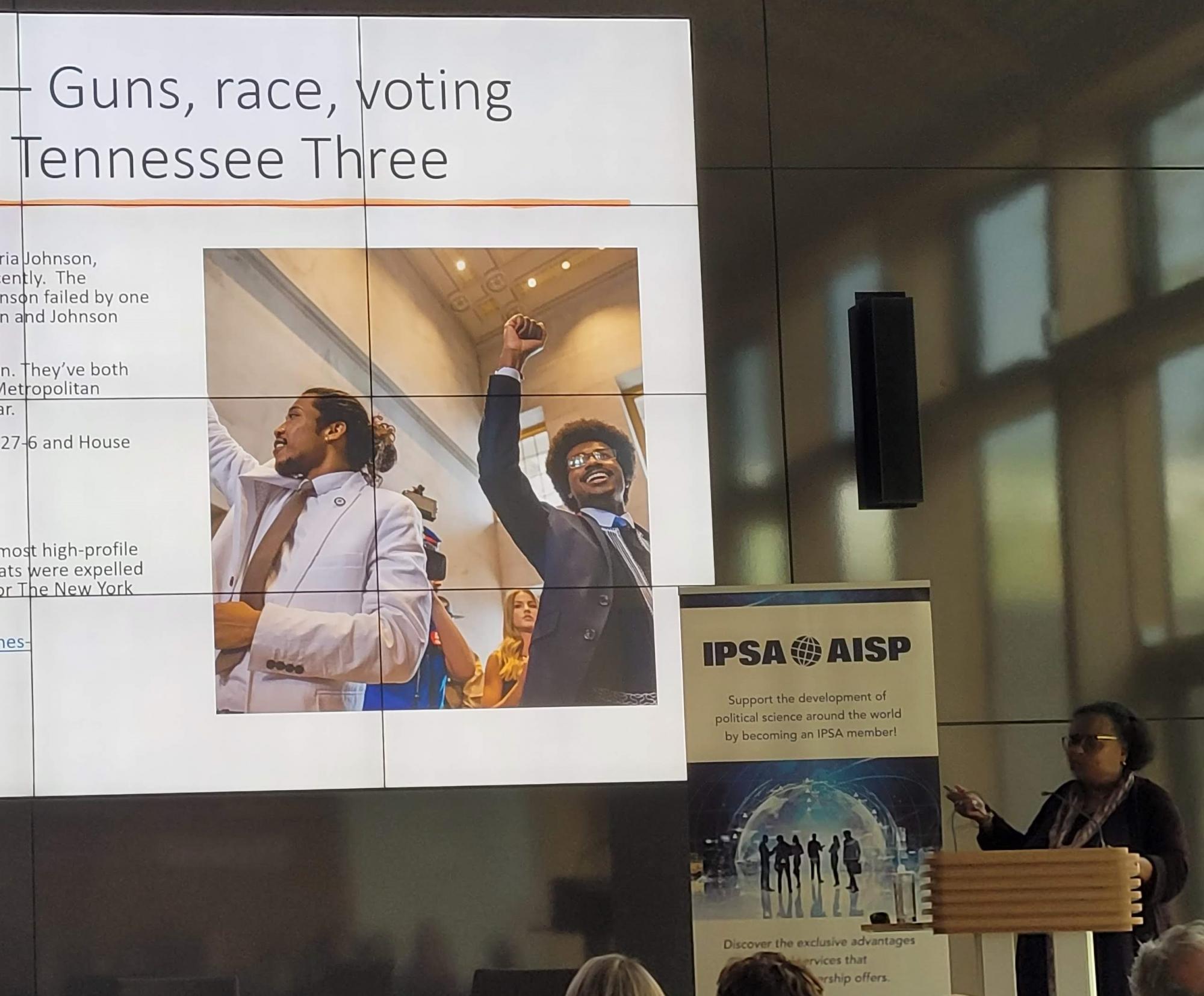 Keynote Speech: Dianne Pinderhughes
Keynote Speech: Dianne Pinderhughes
IPSA President Dianne Pinderhughes began her presentation by thanking the University of Dresden and especially Prof. Dr. Kneuer for her leadership in creating the idea of this workshop.
In her keynote address on American Struggles for Democratic Participation - Reflections on the Results of the 2022 Midterm Elections, Prof. Pinderhughes focused on the election results for the US House and Senate, state legislative results, and the partisan, gender, and racial dynamics of the elections. The keynote address also discussed the racial dynamics in American politics, with case studies in the wake of the 2022 elections.
Photo: Dianne Pinderhughes.
 Roundtable: Polarization, Illiberal Thinking and Anti-Democratic Movements - How to Confront Them
Roundtable: Polarization, Illiberal Thinking and Anti-Democratic Movements - How to Confront Them
The keynote speech was followed by a roundtable discussion moderated by Prof. Dr. Kneuer. Gesine Märtens, State Secretary in the Saxon State Ministry of Justice and Democracy, Europe and Equality; Thomas Lindenberger, Director of the Hannah-Arendt Institute for Totalitarianism Studies and Stefan Locke from the Frankfurter Allgemeine Zeitung newspaper had a lively discussion on polarization in the context of rising anti-democratic movements.
Photo: Marianne Kneuer, Gesine Märtens, Stefan Locke and Thomas Lindenberger.
DAY 2
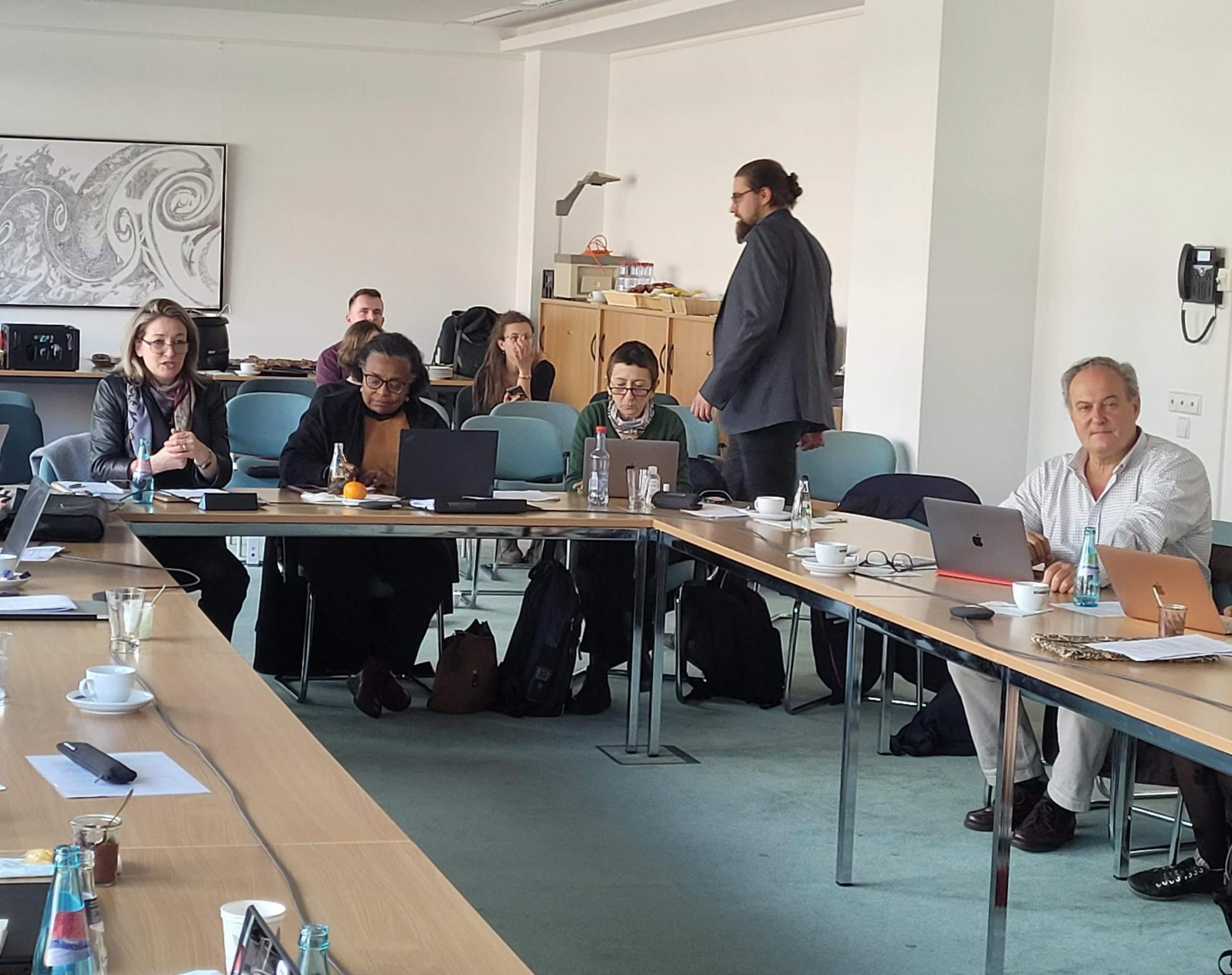 How Can the Liberal Order Cope with the Withdrawal from Democracy and Rule-based Coordination?
How Can the Liberal Order Cope with the Withdrawal from Democracy and Rule-based Coordination?
The second day began with the panel How Can the Liberal Order Cope with the Withdrawal from Democracy and Rule-based Coordination?, chaired by Óscar Luengo (IPSA Summer Schools Coordinator, University of Granada). The panel explored the challenges posed to the liberal order by the withdrawal from democracy and rule-based coordination and discussed potential strategies to address these challenges. The following EC members presented on this panel:
- Serge Granger (IPSA EC member, Université de Sherbrooke) - Is it Possible to Disengage from China?;
- Kim Fontaine-Skronski (IPSA Executive Director) - Conflicting Norms at the WTO: Toward a New Rules-Based Trade System?;
- Anja Jetschke (IPSA EC member, University of Göttingen) - Normative Regional Orders: Between Westphalian Sovereignty and Liberal Orders;
- Francesca Longo (IPSA EC member, University of Catania) - The Future of the Liberal Order;
- Stephen Sawyer (Associate Editor International Political Science Abstracts, American University of Paris) - The Civil Society Paradigm in the Future of the Liberal World Order;
- Discussant: Umut Korkut (IPSA EC member, Caledonian University).
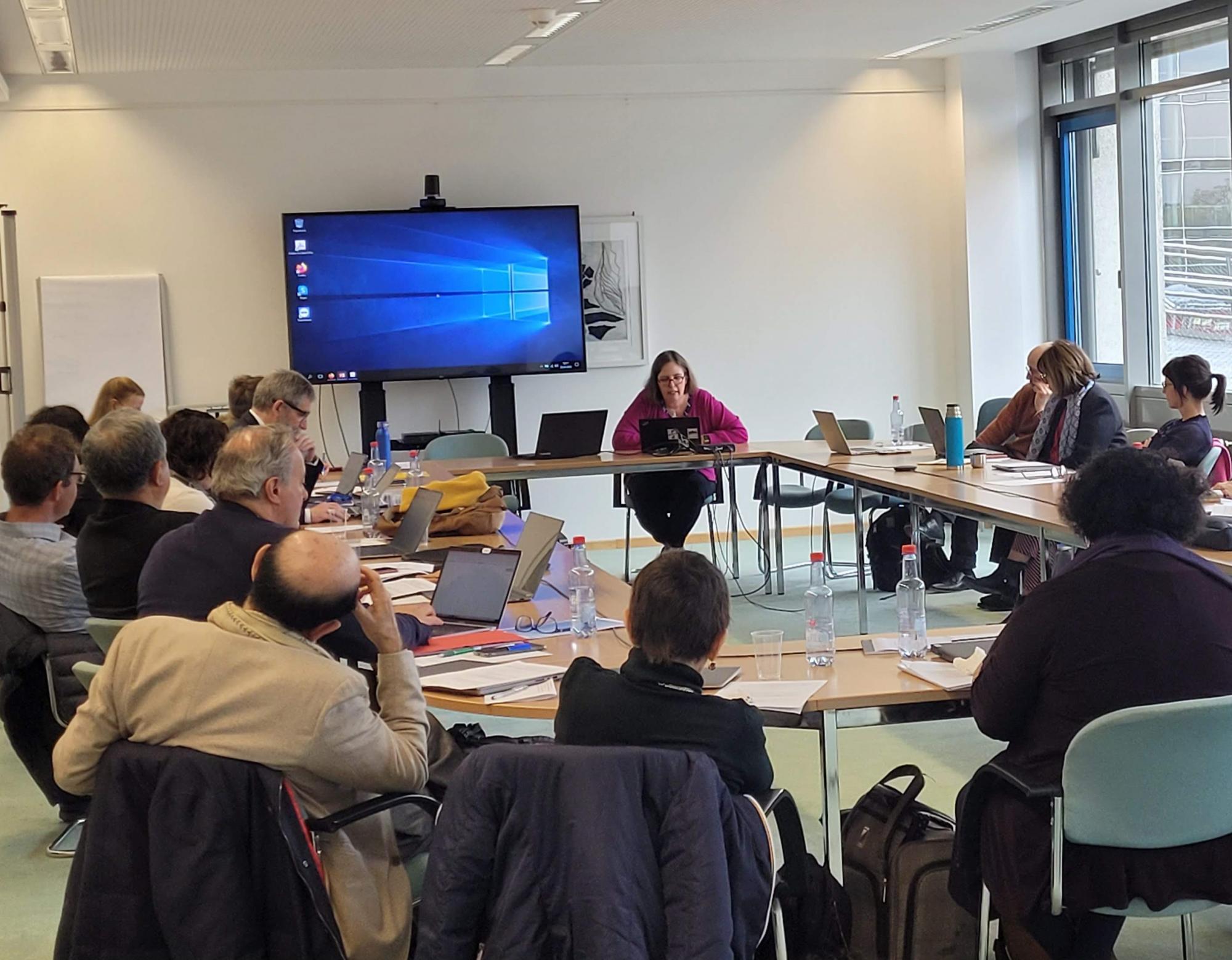 Polarization as Threat to Democratic Societies
Polarization as Threat to Democratic Societies
The following panel, Polarization as Threat to Democratic Societies, was chaired by Martin d’Alessandro (IPSA Vice President, Universidad de Buenos Aires). The panelists explored the impact of political polarization on democratic societies. The following EC members presented on this panel:
- Irasema Coronado (IPSA EC member, University of South Florida) - Migration as a Challenge to Polarized Societies;
- Óscar Luengo (IPSA Summer School Coordinator, University of Granada) - Polarization and Political Communication;
- Emilia Palonen (IPSA EC member, University of Helsinki) - Polarization and Contesting Hegemony: The Hungarian Case;
- Discussant: Francesca Longo (IPSA EC member, University of Catania).
Photo: Emilia Palonen.
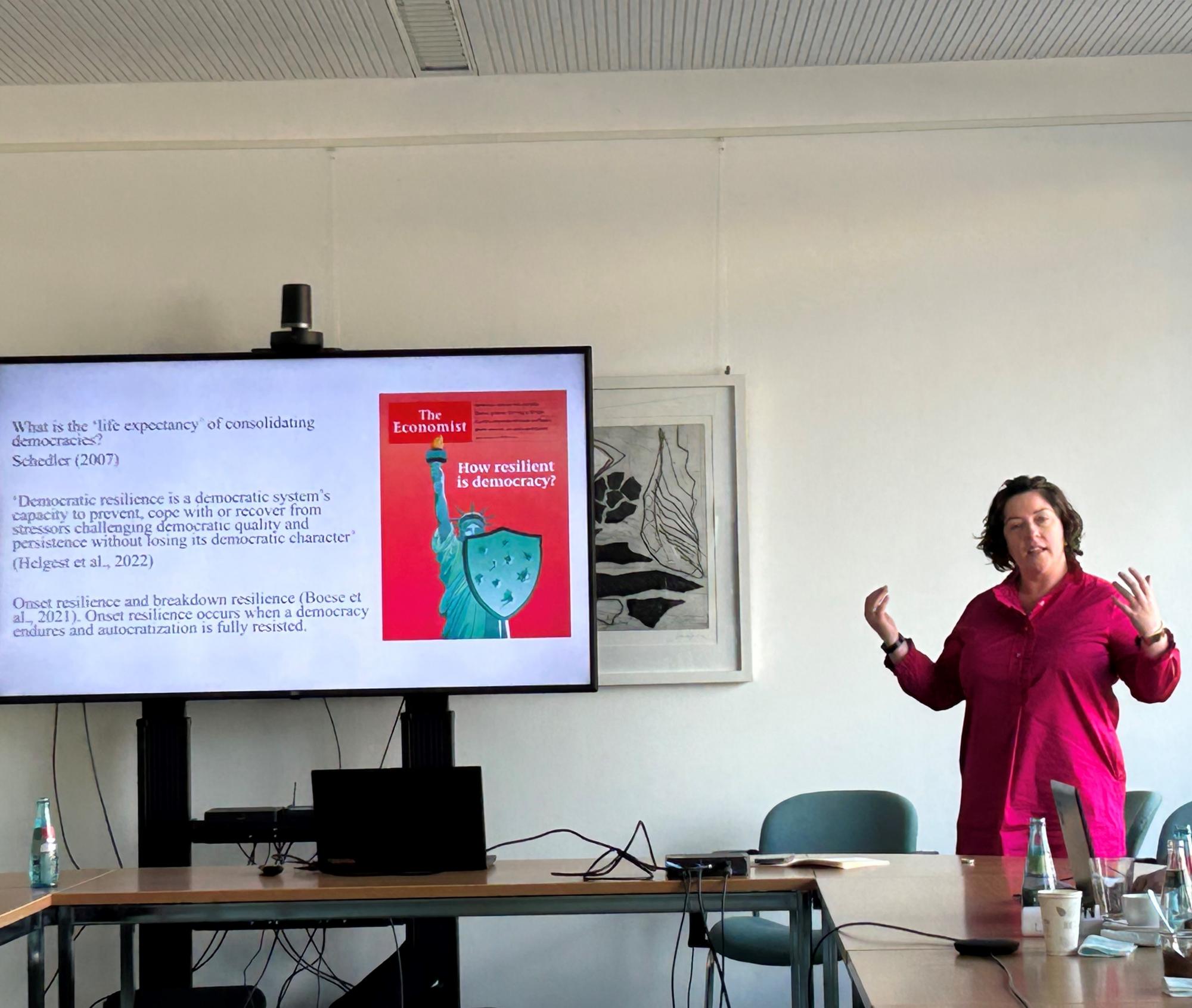 Elements of Resilience to Threats of Democracy
Elements of Resilience to Threats of Democracy
The final panel of the international workshop, Elements of Resilience to Threats of Democracy, was chaired by Nadine Machikou (IPSA EC member, University of Yaoundé II). The panel explored the factors that contribute to the stability and resilience of democratic societies.
The following EC members presented on this panel:
- Madalena Resende (IPSA Vice President, NOVA University of Lisbon) - Catholicism as a Factor in the Democratic Transitions in Southern and Central and Eastern Europe;
- Timofey Agarin (IPSA RC Liaison Representative, Queens University Belfast) - What Kind of Political Representation Makes for a Resilient Democracy in Postconflict Societies: Evidence from Power-Sharing Places;
- Theresa Reidy (2023 IPSA World Congress Program Co-chair, IPSR Co-editor, University College Cork) - The Endurance of Centrist Democracies, a Case Study of Democratic Resilience in Ireland;
- Euiyoung Kim (2023 IPSA World Congress Program Co-chair, Seoul National University) - Citizen Participation and Local Political Efficacy at the Grassroots Level: Case of Residents’ Self-governance Associations in Seoul, South Korea.
Photo: Theresa Reidy.











